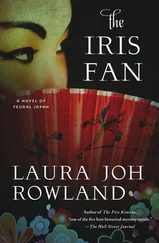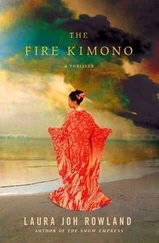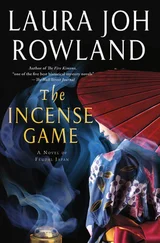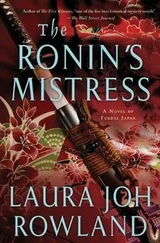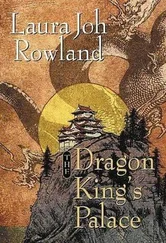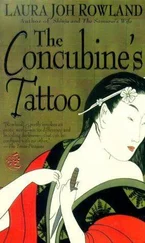Reiko didn’t see much other choice. “I’m the daughter of the magistrate,” she said. But at least she could hide her connection with Chamberlain Sano. “My name is Reiko. We’re here because my father asked me to investigate the murder of the family of a woman named Yugao.”
The headman looked at her as if surprised that she’d spoken for herself as well as by what she’d said. He signaled the outcasts to lower their weapons; they obeyed. As Reiko wondered how a samurai had become their leader, he said, “Would your father be Magistrate Ueda?”
“Yes,” Reiko said, cautious because she heard distrust in his voice.
“Magistrate Ueda demoted me to hinin status. He did the same to many people here.”
Unfriendly echoes of agreement arose from the crowd. Reiko regretted mentioning her father, whose name was unlikely to win her favor among the outcasts. Her guards braced for an attack.
“But the magistrate’s word is the law,” Kanai said with fatalistic gloom. “I suppose that means we have to accommodate his daughter.” He waved his spear at the crowd. “Go about your business.”
The ruffians and spectators slunk away. Relief overwhelmed Reiko. Her guards let out their breath while they sheathed their swords.
“What exactly does she want to do?” the headman asked Lieutenant Asukai.
“You’ll have to ask her.”
Kanai looked increasingly baffled by the unconventional circumstance of a magistrate’s daughter investigating a crime. He turned his quizzical gaze on Reiko.
“First I’d like to see the place were the murders happened,” Reiko said.
“Suit yourself.” The headman shrugged, perplexed yet resigned. “But I’d better take you. It should be obvious by now that you’re not especially welcome here.”
He led the way into the settlement. Two of Reiko’s guards preceded her and the others; the headman’s comrades brought up the rear. As they wove between the tents, the occupants stared at them with sullen curiosity. Some followed Reiko and her party; soon she had a long entourage. So much for a discreet investigation; Reiko could only hope that news of her doings wouldn’t reach anyone in a position to hurt Sano.
The ground under her feet was trampled flat and hard, its surface muddy and slick from water spilled by women washing laundry or cleaning fish. The foul odor of human waste and stagnant cesspools sickened Reiko. There was obviously no night soil collection here. Bonfires burned garbage that hadn’t made its way to the dump; there was no trash collection here, either. Reiko felt filth wetting her socks and hem. How could these people bear living in such squalor?
Her party reached the hovels. Each tiny structure was a patchwork of boards scavenged from burned buildings and construction sites, barely high enough for a man to stand up inside. Their windows were holes covered with dirty paper, their roofs composed of thatch or cracked, broken tiles. Voices argued; a baby squalled. Reiko ducked under ragged clothes strung on lines between the hovels. She and her escorts squeezed past men playing cards in the narrow lanes. They stepped over a drunk who lay unconscious. At one hovel, a man counted coins into the hand of a slovenly woman.
The vices flourished here.
Smoke darkened the atmosphere like a perpetual twilight. The stench was concentrated, as if the outside air couldn’t penetrate. The fact that her father had sentenced people to this life made Reiko uncomfortable even if they’d deserved the punishment.
“Here it is,” Kanai said, stopping outside a hovel. Two features distinguished it from the others-a lean-to built on one side, and a sprinkling of white salt crystals at the threshold, to purify a place where death had occurred. “There’s not much to see, but look all you want.” He held back the faded indigo cloth hung over the doorway.
While the outcasts avidly watched, Reiko stepped inside. Murky daylight filtered through two windows. The sweet, metallic, and foul odors of rotting blood and flesh tainted the air. Reiko’s throat closed; nausea gripped her stomach. On the floor she saw dark patches where blood and viscera had been wiped up but had sunk into the packed earth. The hovel had one room plus an alcove formed by the lean-to; the whole space was smaller than her bedchamber at home. She could hardly believe that four people had lived here. It was empty except for a ceramic hearth in a corner.
Kanai spoke from the door: “The neighbors looted everything that wasn’t too heavy to move-dishes, clothes, bedding. People here are so poor, they don’t mind robbing the dead.”
Reiko saw that she wouldn’t find any evidence here. But although she felt the pollution of death seeping into her, and she was desperate to breathe pure air, she stayed, hoping to absorb clues from the crime scene. On one wall were jagged notches cut with a knife. Reiko counted thirty-eight, perhaps scores from card games. She sensed lingering emotions-rage, terror, despair.
“Pardon my curiosity,” Kanai said, “but why did the magistrate send you to investigate the murders?”
“I have some experience with such things.” Reiko forbore to mention her work for Sano.
The headman frowned in disbelief; women didn’t ordinarily investigate crimes. Then he shrugged, too indifferent to press for an explanation. “But isn’t the case already solved? Yugao has been arrested.”
“The magistrate and I both have doubts about whether she killed her family.”
“Well, I don’t,” Kanai declared. “As far as I’m concerned, Yugao is guilty.”
“Why is that?”
“I was here that night. I discovered the murders. I caught Yugao.”
Reiko had planned to search for the first witness at the scene after the murders; now luck had saved her the work. “Tell me what happened.”
The headman’s expression said he didn’t understand why she wouldn’t just accept his word as truth instead of bothering herself with hinin business, but again he shrugged. “My assistants and I were patrolling the settlement. Constant vigilance is the only way to keep order.” Reiko noted his upper-class diction. “We heard screams coming from this area.”
Reiko pictured him and his men carrying torches through the dark settlement, the bonfires burning and the residents brawling in the night; she heard women screaming.
“By the time we reached this house, the screams had stopped. The man was lying there.” Kanai pointed at a blood-soaked patch on the floor. “I think he died first. He was in bed. His wife lay there, and his younger daughter there.” Reiko followed his pointing finger to two other spots, across the room, where the floor was stained reddish-brown. “They’d been chased. You can see the bloody footprints.”
Reiko also saw blood spattered on the plank walls and envisioned two terrified women running while a blade slashed them.
“All the victims had been stabbed many times all over their bodies. They had cuts on their hands because they’d tried to defend themselves.” Kanai entered the hovel, stood in the center. “Yugao was sitting here, surrounded by the corpses. There was blood smeared on her face. Her clothes were drenched with it. She was holding the bloody knife.” He shook his head. “I’ve seen murders before-they’re not exactly rare here-but this one shocked me. I said to Yugao, ‘Merciful gods, what happened?’ ” Emotion colored his dispassionate tone. “She looked up at me, perfectly calm, and said, ‘I killed them.’ Well, that seemed obvious. So I turned her over to the police.”
He’d confirmed what the doshin had said at Yugao’s trial. His description of that night brought it to vivid life for Reiko, who felt more inclined than ever to believe that Yugao was as guilty as she said. Yet Reiko couldn’t conclude her investigation based on the testimony of a witness who’d arrived at the scene after the murders were done.
Читать дальше

